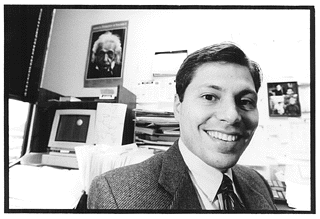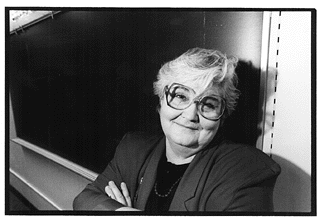Teachers Eye Union Label
Four Texas Teacher Associations Fight for Members
By Roseana Auten, Fri., Feb. 28, 1997

Louis Malfaro, President of the Austin Federation of Teachers |
A representative of the Oregon Teachers' Association maintains that school administrators initially agreed to most of the teachers' demands, but reneged when the time came to actually sign a contract agreement with teachers. The strike, he said, was a last resort after all other remedies, including mediation, were thoroughly exhausted.
"A strike is one of the last things a teacher wants to go through," said Steve Snow, a fourth grade teacher in Sandy and a 12-year veteran of the profession, who will be paid only $100 per week as long as he's off the job. "But at the same time, it's frustrating to try to negotiate these things and make no progress for over a year. You get to a point where you're forced into a corner."
What would Snow do if he and his fellow teachers weren't permitted to run this final power play in their contract negotiations? "I'd just hope I'd never be taken advantage of," Snow said.
Teachers in Texas face the same battles over working conditions as Oregon teachers do -- but here, their conflicts could never be resolved by a strike, or even the threat of a strike. Collective bargaining -- and hence, the right to strike -- is illegal in Texas for public employees, including teachers. Instead, teachers may "meet and confer" or consult annually with school boards and administrators over salaries, benefits, and working conditions. But the teachers' requests are non-binding, and points of impasse between teachers and administrators are usually resolved without the benefit of outside mediation or arbitration.

Gerry Brooks, President of the Austin Association of Texas Professional Educators |
The Big Four
Four major groups compete for membership among the state's 240,000 public
school teachers. Two are local chapters of national organizations: The Texas
State Teachers Association (TSTA) is an affiliate of the National Education
Association (NEA) and the first teachers' association in Texas; and the Texas
Federation of Teachers (TFT) is affiliated with the American Federation of
Teachers (AFT), which is in turn affiliated with the AFL-CIO. Two other groups
have no national affiliation -- the Texas Classroom Teachers Association
(TCTA), and the Association of Texas Professional Educators (ATPE). (For
membership figures, see box.) All four groups claim to advance the professional
interests and development of teachers, but some marked differences in
philosophy among them remain.The unions -- the TSTA/NEA and the TFT/AFT -- are more political, and perhaps more controversial than the other two organizations, and have slightly differing priorities. Both unions would like to see the state move toward collective bargaining, but realize that strong anti-collective bargaining sentiment among Texas lawmakers (and to some degree, the public) won't permit that to happen for now. The TSTA, the state's largest organization, has the resources to reach out more to teachers in suburban and rural districts. The TFT, the smallest of the four, operates more in cell-block fashion, and its membership tends to be stronger in urban areas. The TSTA/NEA imposes term limits on all its officers, while the TFT/AFT does not.
The NEA, especially, is a favorite punching bag for religious and political conservatives because of the group's pro-choice, pro-gun control stance. But conservatives are often very harsh on the institution of American public education in general; accordingly, the NEA has spent a great deal of its resources defending the quality of public schools -- and the integrity of the teachers who work in them. "If you lose the confidence of the public, you lose public schools," said Richard Kouri, president of the TSTA. "So we have to fight against the AM radio version of public education." Kouri also blames the group's scapegoat status with Texas conservatives on TSTA's vigorous opposition to private school vouchers.
Little brother TFT/AFT, while no less supportive of teachers and public education, is seen as more bullish on the need for reform. AFT's national president, the late Albert Shanker (who died February 22), was rather fearless about leveling criticism wherever he thought it belonged. Writing weekly in space purchased in the Sunday New York Times editorial section, Shanker frequently railed at the low academic standards and tepid security practices in U.S. schools, and he did not always count school trustees and administrators as teachers' allies. "We don't feel it's important that we be loved by school boards and superintendents -- only respected," said TFT secretary/treasurer John O'Sullivan.
Despite the fact that both national unions have designed volumes of support materials for classroom instruction and professional development, neither has completely shed their reputations among the general public for being mainly interested in "pocket book" issues. "Where [the NEA and AFT] get beat up on their agenda is that they're seen as too focused on salaries and benefits, and not on standards and student achievement," said Mark Musick, president of the Southern Regional Education Board, a coalition of 15 southern states that works on education policy.
A merger of the NEA and AFT has lurked as a possibility for years, though most observers say the AFT would have to weaken its ties to the AFL-CIO before the marriage could take place, in order to placate teachers who prefer to think of themselves as professionals, not laborers. "We're definitely dancing with one another," joked TFT secretary O'Sullivan, "but nobody's gone home with anybody."
But both groups envision a time when they've moved beyond negotiating contracts and are able to control and police their own profession, much as physicians and lawyers do, said Joe Newman, an education professor who heads up a research group on teachers' unions for the American Educational Research Association. The NEA and AFT "are very sincere, but [self-policing] may be a pipe dream," Newman said, "because it could be seen as a violation of public trust." He believes the voting public isn't yet prepared to let the inner workings of the teaching profession fade from their scrutiny. Whereas professionals such as doctors can set their own standards and practices through an organization like the American Medical Association, the public has too much interest -- and too many tax dollars -- invested in the classroom to leave educators alone in a similar way.
In an attempt to distinguish themselves from the unions, the state's two independent organizations -- the TCTA and the ATPE -- label themselves as professional associations, and espouse philosophies that are starkly anti-union. Neither group advocates collective bargaining or the right to strike, because they believe it's too combative; for them, it's far more important -- and more productive -- to instead approach school boards and administrators in a spirit of collegiality. "Our stance is less confrontational -- we prefer to organize within the system," said Jeri Stone, executive director of the TCTA, the state's second oldest teachers' association.
Whereas the other state organizations claim members who have moved from the classroom into school management, TCTA limits its membership to practicing teachers, teachers' aides, librarians, and counselors only. The group has a small following in Austin and tends to be more active in other areas of the state.
The ATPE agrees that collaboration, not conflict, between instructional and management personnel is key to getting things done. "What you gain from being a squeaky wheel, you lose in [goodwill] later on," said executive director Doug Rogers. ATPE's critics often point to the group's emphasis on smooth relations with school administrators as evidence that ATPE is "dominated" by school administrators, but Rogers denied that is the case. Only about 7% of ATPE's members fall into that category, he said.
A Collective Bargaining Substitute
Although both ATPE and TCTA, the independent organizations, eschew the union
label, at times they behave remarkably like unions, aggressively lobbying state
legislators to get reforms into state law to enhance the dignity of their
profession (see accompanying story). Even so, their goal of collaboration
influences those legislative priorities. For example, in a recent position
statement on state education policy, ATPE advocated "local control of
consultation policies provided that exclusive representation of employees not
be granted to only one employee organization in a district." In other words,
anyone with a constituency should be able to represent that constituency before
the school board and administrators in contract discussions. That's not a
position "labor" unions would rally behind. It's this particular position on "meet and confer" -- which necessarily must substitute for collective bargaining in Texas -- that could create some friction among local chapters of the teacher organizations in the Austin Independent School District (AISD). Since 1971, district policy has provided for the Austin Association of Teachers (AAT, the TSTA/NEA affiliate) to exclusively hold the right to meet and confer with members of AISD administration and the Board of Trustees. That's partly by default -- for many years, the AAT was the only teachers' group in AISD, and this policy hasn't been reviewed since 1984.
Understandably, the two other organizations active in the district -- the Austin Federation of Teachers (AFT, the TFT/AFT affiliate) and the Austin ATPE (AATPE) -- would like to see this policy change. The AFT believes that one group should continue representing all teachers, but that the matter should be put to a vote among all teachers (whether they're in a group or not) on which group should represent them. "An election mechanism will ensure that representation is fairly selected," said Louis Malfaro, AFT's president. Teachers could even vote to continue to keep AAT as their representative, he pointed out, but it's more important to keep "one, strong voice" in the consultation process.
In accordance with her state organization's position, AATPE's president, Gerry Brooks, believes that every teachers' group should be allowed at the bargaining table -- it's only fair. "I feel all voices need to be heard," she said.

Ruben Valdez, Jr., President of the Austin Association of Teachers |
As part of the AISD board's ongoing project of revising all district policy, the consultation policy will likely get some close scrutiny, said Liz Hartman, secretary of the AISD Board of Trustees. "It's time. The landscape has changed," she said. "In addition to our education mission, we are a major employer, and we need to address employee issues." Hartman said she is inclined to keep one group at the table to represent all teachers -- but the way in which that one group is selected for sole representation is up for debate.
A Texas school district that has more or less successfully dealt with strife over the consultation issue is the Corpus Christi ISD, where the matter was first put to a vote in 1979; the Corpus Christi Federation of Teachers (CCFT) won and has held the exclusive meet and confer rights since 1986. As for using multiple representatives in consultation -- "been there, done that," says CCFT president Linda Bridges. "It was a three-ring circus, because it allowed the administration to pit the groups against each other."
But the state's fourth association, the TCTA (which has a small membership and is not very visible in AISD), believes AISD is behind the times, fighting old battles with old strategies. "The classic consultation model is a dead issue," said TCTA executive director Stone. Her members think it's more effective to work in site-based committees on contract issues, she said, instead of approaching the school board or the superintendent for negotiations that really amount to nothing more than "a formalized chat."
The Search for Dues-Payers
One might think these various, strong differences of opinion among the groups
about the best way to advance the professionalism of teaching would attract
followers. And yet, on the whole, teachers don't seem to find these ideological
distinctions very important. Their chief reason for aligning with any group at
all is the liability insurance that comes with their membership. A harsh word
here or there, or a touch, have a way of escalating into major incidents, and
many teachers worry about being sued by a parent, said Luiz Lazaro, a
fifth-grade teacher at T.A. Brown Elementary School and an AFT co-ordinator.
"You may need a good representative" in that situation, he said. "It's not
something you can carry off by yourself, I don't think."His argument apparently hasn't swayed Sally Reagan, who also teaches fifth grade at the same school. Like many other teachers who have not joined any group, the cost of the dues -- a $29 monthly payroll deduction -- has been the primary deterrent to association membership for her. Confident in her own ability to deal with conflict, she doesn't feel the same need for legal protection. "I guess it's not a concern," Reagan said. "Maybe I'm being naïve, but hopefully, I won't need a lawyer, ever." Travis High School teacher Sharon Beynon isn't in a group this year either, but only because she didn't get around to paying her membership dues. "I have no good reason for not doing it," Beynon admits. "I totally believe in them [teacher groups]."
Union converts agree, though, that it's better to head off trouble before it happens -- especially if it involves your campus principal. "I tell them, it's for your protection," said one teacher/membership recruiter (who asked not to be identified), who described the relationship between teachers and some campus principals as "love/hate." Some principals work very well with teachers' associations, this teacher said. But if you're working with a vindictive principal who knows you aren't affiliated with a group, said another teacher (who also requested anonymity), then you could be open to all kinds of retaliation, including getting fired.
But if teachers are so vulnerable, what else, besides the cost of dues, might account for the fact that some 25% of AISD's 5,500 teachers haven't joined any group? One teacher had a surprising answer: Because of the absence of collective bargaining and the right to strike in Texas, the unions and associations "basically have no power," said John Garcia, an unaffiliated teacher at Austin High School.
It's an argument AFT's president Malfaro has heard from teachers before. His response: "I tell them, `How are we going to get that [power] if you don't join?'"
Got something to say on the subject? Send a letter to the editor.






